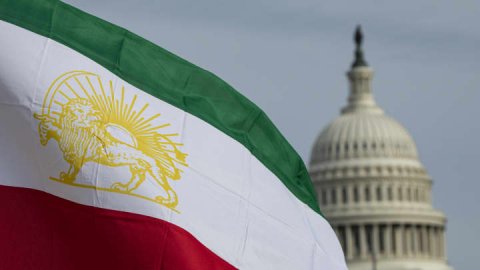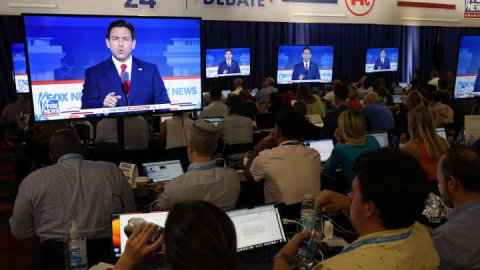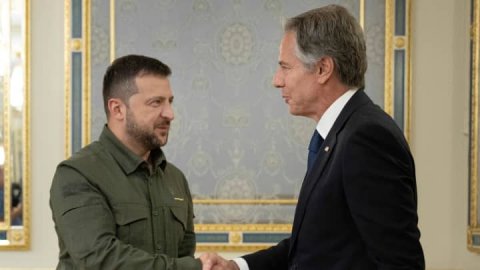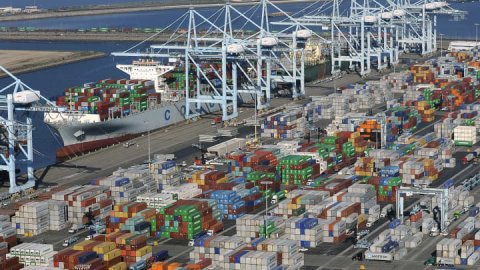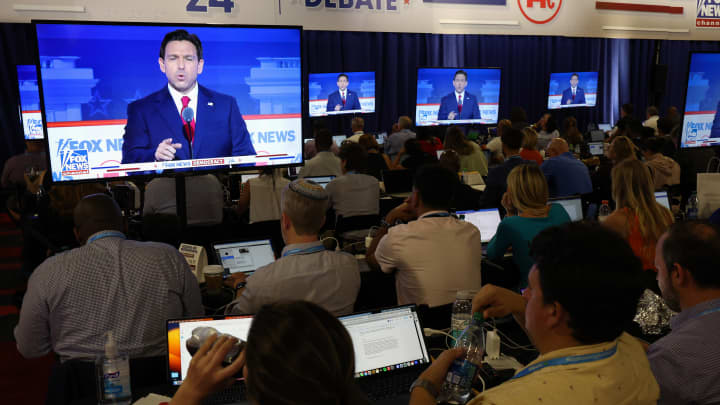
The Republican presidential nominating fight just eclipsed $100 million in ad spending, as the GOP field burns money at a historic rate — and as the contenders illustrate their strategies to win the party's nod.
Former President Donald Trump's allies have dominated in national television spending, according to figures from the ad-tracking company AdImpact, as his political operation looks to cement Trump's status as the inevitable nominee and prepare for a bruising general election fight, all while fighting state and federal criminal charges.
But Trump's Republican rivals are mounting an effort below the surface to blunt his momentum where it matters most: in the key states of Iowa and New Hampshire — and South Carolina, too, though to a much lesser extent. There's been hardly any meaningful ad spending outside those three early-voting states, reflecting how many Republicans see the early contests as not just a pivotal moment but really the only chance GOP challengers have to keep the former president from steamrolling to the party's nomination.
That dynamic, along with the spread of deep-pocketed super PACs, has contributed to an advertising fight that's ramped up faster than ever and spread through newer media to keep up with changing consumer habits.
Just looking at TV and radio ads and discounting a digital realm that has grown rapidly in recent years, Republicans have spent $80.5 million through August on the presidential race. Through the same point on the calendar in 2019, Democrats competing in their party's open presidential primary had spent just $15.1 million on TV and radio ads.
And Republican candidates and groups spent just $13.5 million through August 2015, the last time the party had an open presidential nominating fight.
More from NBC News:
Overall, Republicans have spent more than $102 million on ads (including digital and streaming television ads) this cycle.
So while ads are hardly the only piece of the strategy to win the GOP presidential nomination, the pace and game plan behind that spending reflects the contours of the GOP race.
Just as former President Donald Trump is the far-and-away leader in national primary polling, his outfit is the clear leader in national television spending, too.
MAGA Inc., the super PAC backing the former president, has spent $18.5 million so far on national television ads. That's more than every other Republican group and candidate in the field combined.
Never Back Down, the super PAC supporting Florida Gov. Ron DeSantis, has spent more than $6 million on national television, with no other group or candidate spending more than $2 million to air TV ads across the whole country.
The national ads are helping to push both candidates' message s to the broader GOP electorate, but with Trump as the GOP front-runner, his allies are also President Joe Biden in the hopes of starting the general election early.
"Trump's dominating the race," as the text "Trump beats Biden ... dominates GOP field" is displayed on the screen.
"Only Trump's ready to get our economy, our country, back on track."
Even though Trump holds big polling leads in both Iowa and New Hampshire, his rivals are dominating the ad spending charts in those states. The reason is clear: If Trump's rivals can't stop him early, his big national polling lead is what will come to pass in state after state. An early-state win is their chance to shock the GOP system into a broader shift.
The early-state ads also paint a clear picture of the haves and the have-nots in the 2024 campaign.
Trump, DeSantis and former Ambassador to the U.N. Nikki Haley are relying almost exclusively on their super PACs to spend millions to get their message on the air in early states.
North Dakota Gov. Doug Burgum and his aligned super PAC have been trading off stretches of seven-figure spending as the candidate looks to win enough support on Sept. 27.
South Carolina Sen. Tim Scott is the only candidate whose campaign and super PAC have been consistently on the airwaves in the early states with a significant amount of television spending.
Having a well-funded super PAC is an obvious advantage, but the — which he built up as a senator and then transferred to his presidential campaign — gives him an important edge, too, because candidates can book ads at cheaper rates than outside groups, stretching their money further.
Iowa's top ad spender so far is Never Back Down, the pro-DeSantis group that says it's marrying a big ad budget with a massive ground game. It spent $5.5 million through the end of August on ads in Iowa.
The next two Iowa spenders through August are from Scott's orbit: the senator himself, whose campaign has spent $4.6 million, and TIM PAC, which has spent $2.9 million.
Burgum and his aligned super PAC, Best of America, have spent $2.6 million and $2.7 million in Iowa, respectively.
Stand for America Fund Inc., which is backing Haley, has spent $2.9 million in the state, and Trump's MAGA Inc. $2.2 million.
New Hampshire is a similar story, with the pro-Burgum and pro-Scott outfits at the top of the list, with the pro-Haley, pro-DeSantis and pro-Trump efforts spending millions, too.
The heavy focus on Iowa and New Hampshire comes amid signs that at least one key Republican group is shifting resources away from some contests later on the calendar to redouble efforts to battle Trump in 2024's earliest contests instead.
NBC News reported last week that Never Back Down is in Nevada, as well as California, with super PAC spokesperson Erin Perrine saying "we want to reinvest in the first three" states holding presidential nominating contests because those "are going to set the conditions for the March states."
Jess Szymanski, another spokesperson with Never Back Down, told NBC News that the group plans to "keep up our aggressive efforts in the first three primary states as the political season heats up." She added the group plans to reserve at least $25 million in ads in Iowa and New Hampshire between Labor Day and Halloween and pointed to the group's aggressive efforts to build a ground-game to benefit DeSantis, too.
Never Back Down is the only group affiliated with a candidate to spend significantly in South Carolina, dropping more than $3.5 million there.
One wrinkle that could help the non-Trump candidates: They're all getting a boost from "Win It Back PAC," a group affiliated with the conservative Club for Growth that has spent about $6 million that don't specifically boost an alternative candidate.

